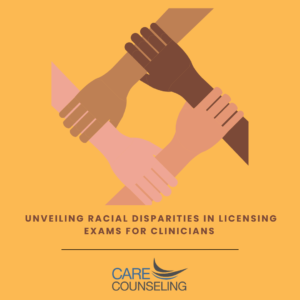 In the pursuit of equitable healthcare, it is crucial to address the systemic barriers that hinder underrepresented communities from entering and excelling in the field of clinical practice. One area that demands attention is the racial disparities found within licensing exams for clinicians. While licensing exams are designed to ensure competence and protect the public, they inadvertently perpetuate racial inequities. This blog post aims to shed light on the alarming racial disparities in licensing exams, explore their underlying causes, and propose steps to mitigate these disparities for a more inclusive and diverse healthcare workforce.
In the pursuit of equitable healthcare, it is crucial to address the systemic barriers that hinder underrepresented communities from entering and excelling in the field of clinical practice. One area that demands attention is the racial disparities found within licensing exams for clinicians. While licensing exams are designed to ensure competence and protect the public, they inadvertently perpetuate racial inequities. This blog post aims to shed light on the alarming racial disparities in licensing exams, explore their underlying causes, and propose steps to mitigate these disparities for a more inclusive and diverse healthcare workforce.
The Significance of Licensing Exams
Licensing exams serve as a critical component of the regulatory process in healthcare professions. They evaluate the knowledge, skills, and competencies of aspiring clinicians to safeguard patient welfare. However, several studies have shown that racial disparities persist in the outcomes of these exams. These disparities have profound implications, as they can perpetuate the underrepresentation of minority communities in healthcare, limit access to culturally competent care, and compromise health outcomes for marginalized populations.
Unpacking the Disparities
The existence of racial disparities in licensing exams is multifactorial, stemming from various underlying causes. One key factor is the lack of diversity in the development and validation of exam content. The exam questions often reflect the cultural biases and experiences of the majority group, neglecting the perspectives and challenges faced by racial and ethnic minorities. As a result, minority candidates may find it more difficult to relate to and navigate through the exam content.
Furthermore, educational disparities play a significant role in perpetuating these exam inequities. Historical inequities in educational opportunities, limited access to resources, and biased testing practices can create a disadvantage for racial and ethnic minority students. As a consequence, they may encounter additional barriers in preparing for licensing exams, leading to lower pass rates compared to their white counterparts.
The Role of Implicit Bias
Implicit bias, often unintentional and unconscious, also contributes to racial disparities in licensing exams. Examiners may inadvertently favor certain candidates or display differential expectations based on racial stereotypes, thus influencing the exam outcomes. This bias can manifest during the exam administration, scoring process, or in the evaluation of practical skills, leading to unfair assessments and unequal outcomes.
Addressing the Disparities
To address these disparities, a multifaceted approach is necessary. First and foremost, the diversification of exam development and validation processes is crucial. Including diverse perspectives in question development committees, conducting bias reviews, and piloting exam questions with diverse populations can help mitigate cultural biases in content and promote inclusivity.
Secondly, addressing educational inequities is vital. This involves improving access to quality education for underrepresented communities, providing comprehensive test preparation resources, and implementing mentoring programs to support minority students throughout their educational journey.
Lastly, awareness and training on implicit bias should be integrated into the exam administration and scoring processes. This will help minimize the influence of unconscious biases on exam outcomes and ensure fair evaluations for all candidates.
To achieve a more equitable healthcare system, it is imperative to recognize and rectify the racial disparities that persist within licensing exams for clinicians. By diversifying exam development, tackling educational inequities, and addressing implicit biases, we can strive toward a more inclusive and diverse healthcare workforce. Only by actively promoting fairness and equal opportunities can we break down the barriers that hinder racial and ethnic minorities from accessing the healthcare profession and providing culturally competent care to all communities.
We’re Here to help
Our wellness experts will be happy to take care of you. You can CLICK HERE to schedule an appointment now or call (612)223-8898.
Meet Clinicians
We’re united by our commitment to providing effective, relevant, and innovative mental health support at all stages of your journey. Click Here to find a therapist or find out more about who we are, where we come from, and how we live out CARE’s mission every day.
The professionals at CARE are actively collecting and creating resources to help with what you need and address frequently asked questions. We’re Here for You.



